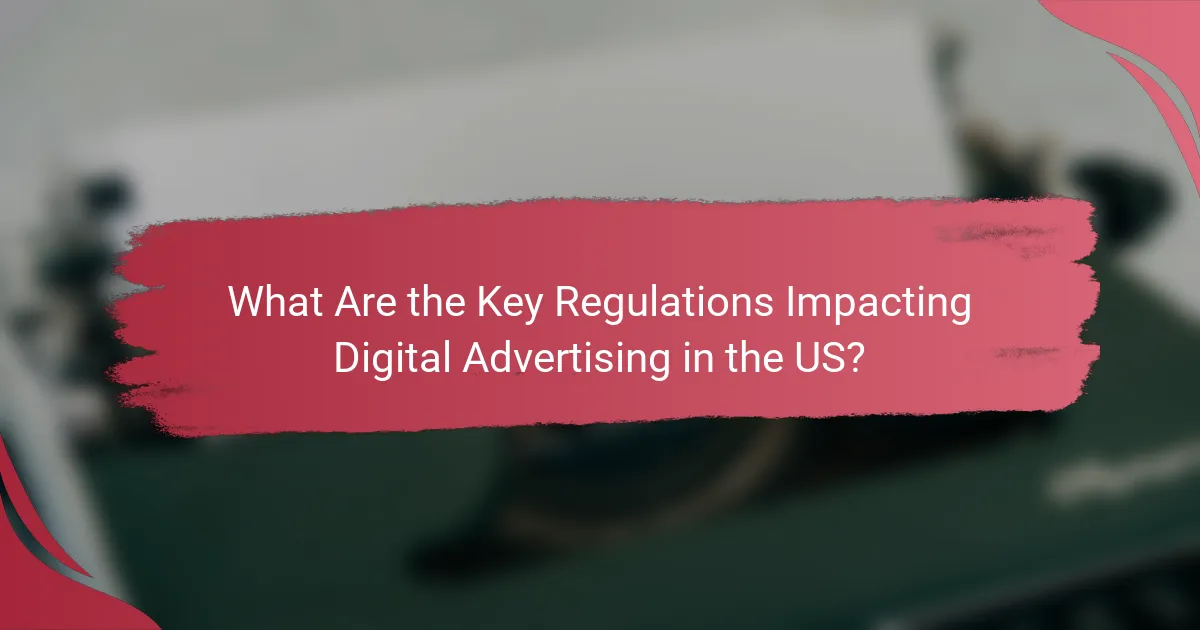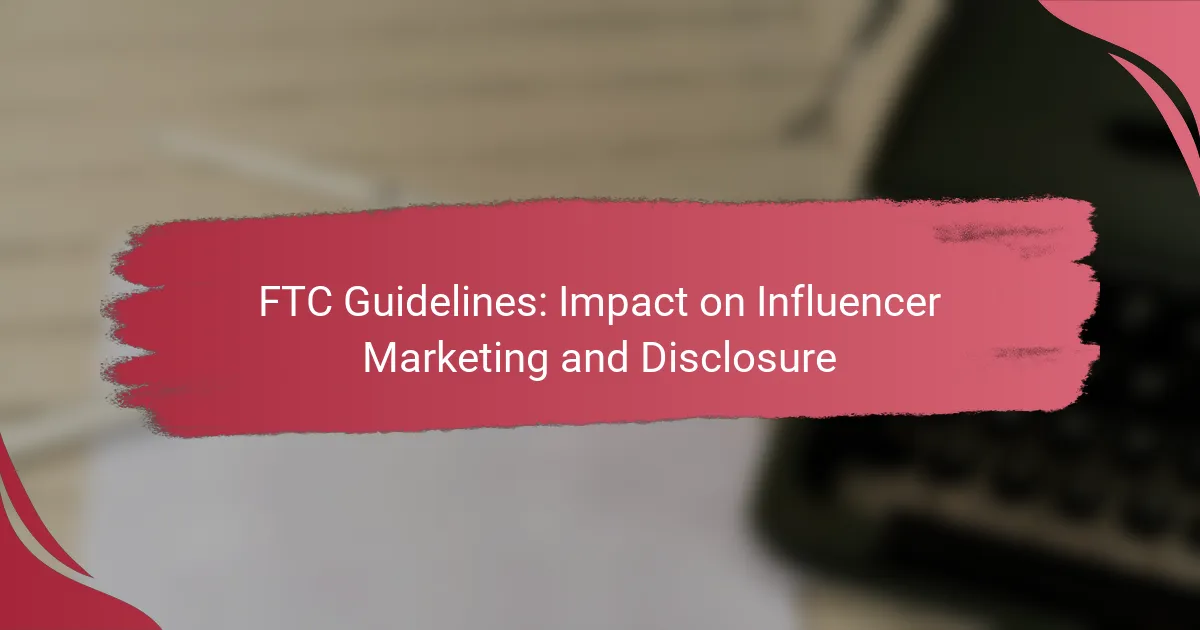The introduction of new regulations is reshaping the landscape of digital advertising, imposing stricter compliance requirements that affect targeting capabilities and data collection practices. Advertisers must navigate these changes carefully to avoid penalties and ensure their marketing strategies remain effective. Key regulations, such as the CCPA and GDPR, dictate how consumer data is handled, necessitating a proactive approach to compliance that includes regular audits and team training.

How Do New Regulations Affect Digital Advertising?
New regulations significantly impact digital advertising by imposing stricter compliance requirements, altering targeting capabilities, and changing data collection practices. Advertisers must adapt to these changes to avoid penalties and maintain effective marketing strategies.
Increased compliance costs
Compliance with new regulations often leads to increased costs for digital advertisers. Businesses may need to invest in legal consultations, compliance software, and training for staff to ensure adherence to the latest rules.
For example, companies may face costs ranging from a few thousand to tens of thousands of dollars depending on the complexity of the regulations and the size of the organization. Budgeting for these expenses is essential to avoid unexpected financial strain.
Changes in targeting capabilities
New regulations can limit the targeting options available to advertisers, affecting how they reach their audiences. Restrictions on the use of personal data may require advertisers to rely more on contextual targeting rather than behavioral targeting.
As a result, advertisers should explore alternative strategies, such as leveraging broader audience segments or focusing on demographic data. This shift may require a reevaluation of existing campaigns to optimize performance under the new rules.
Impact on data collection practices
Regulatory changes often lead to stricter guidelines on data collection practices, affecting how advertisers gather and use consumer information. Advertisers must ensure they obtain explicit consent from users before collecting personal data, which can reduce the volume of data available for targeting.
To adapt, businesses should implement transparent data collection processes and prioritize user privacy. This may involve updating privacy policies and ensuring that data handling practices align with regulations, ultimately fostering consumer trust.

What Compliance Strategies Should Advertisers Implement?
Advertisers should adopt a multi-faceted approach to compliance strategies that includes regular audits, training for teams, and the use of compliance software. These strategies help ensure adherence to evolving regulations and mitigate risks associated with digital advertising.
Regular audits of advertising practices
Conducting regular audits of advertising practices is essential for identifying compliance gaps. These audits should assess whether marketing materials align with current regulations and internal policies.
Consider scheduling audits quarterly or bi-annually to stay ahead of regulatory changes. Utilize checklists to evaluate key areas such as data privacy, consent management, and content accuracy.
Training for compliance teams
Training for compliance teams is crucial to ensure they understand the latest regulations affecting digital advertising. Regular training sessions can cover topics such as data protection laws, advertising standards, and ethical marketing practices.
Incorporate real-world scenarios and case studies into training to enhance understanding. Aim for at least one comprehensive training session per quarter, supplemented by ongoing updates as regulations change.
Utilizing compliance software
Utilizing compliance software can streamline the process of maintaining regulatory adherence in digital advertising. Such tools can automate monitoring, reporting, and documentation, reducing the risk of human error.
When selecting compliance software, look for features like real-time alerts for regulatory updates and customizable reporting options. Investing in reliable software can save time and resources while ensuring compliance with local laws and standards.

What Are the Key Regulations Impacting Digital Advertising in the US?
Key regulations affecting digital advertising in the US include the California Consumer Privacy Act (CCPA), the General Data Protection Regulation (GDPR), and guidelines from the Federal Trade Commission (FTC). These regulations shape how businesses collect, store, and use consumer data, impacting advertising strategies and compliance requirements.
California Consumer Privacy Act (CCPA)
The California Consumer Privacy Act (CCPA) grants California residents specific rights regarding their personal information. Businesses must inform consumers about data collection practices and allow them to opt-out of the sale of their data.
Companies must implement processes to respond to consumer requests for information and deletion of their data. Non-compliance can result in significant fines, making it crucial for businesses to understand and adhere to CCPA requirements.
General Data Protection Regulation (GDPR)
The General Data Protection Regulation (GDPR) is a comprehensive data protection law that applies to any business handling the personal data of EU residents, regardless of where the business is located. It emphasizes transparency, requiring companies to obtain explicit consent before collecting personal data.
Under GDPR, individuals have the right to access their data, request corrections, and demand deletion. Businesses must ensure they have robust data protection measures in place, as violations can lead to hefty penalties, often reaching millions of euros.
Federal Trade Commission (FTC) guidelines
The Federal Trade Commission (FTC) provides guidelines to ensure that advertising is truthful and not misleading. Advertisers must clearly disclose material connections with endorsers and avoid deceptive practices that could mislead consumers.
Compliance with FTC guidelines is essential for maintaining consumer trust and avoiding legal repercussions. Businesses should regularly review their advertising practices to ensure they align with FTC standards, particularly in digital campaigns where transparency is key.

How Can Advertisers Adapt to Regulatory Changes?
Advertisers can adapt to regulatory changes by being proactive in their strategies, investing in technologies that prioritize consumer privacy, and seeking guidance from legal experts. These steps help ensure compliance while maintaining effective advertising practices.
Implementing flexible advertising strategies
Flexible advertising strategies allow brands to pivot quickly in response to new regulations. This may involve diversifying ad channels or adjusting targeting methods to comply with privacy laws while still reaching the intended audience.
For example, advertisers might shift from behavioral targeting to contextual advertising, which focuses on the content of the webpage rather than user data. This approach can help maintain engagement without infringing on privacy regulations.
Investing in privacy-focused technologies
Investing in privacy-focused technologies is essential for compliance and consumer trust. Tools that anonymize user data or enhance consent management can help advertisers navigate complex regulations while still delivering personalized experiences.
Consider adopting solutions like Customer Data Platforms (CDPs) that prioritize data protection and allow for transparent data collection practices. This not only aids in compliance but also builds consumer confidence in your brand.
Engaging with legal experts
Engaging with legal experts ensures that advertising practices align with current regulations. Legal professionals can provide insights on compliance requirements and help develop strategies that mitigate risks associated with non-compliance.
Regular consultations with legal advisors can help advertisers stay updated on changes in laws and regulations, such as the General Data Protection Regulation (GDPR) in Europe or the California Consumer Privacy Act (CCPA) in the U.S. This proactive approach can prevent costly fines and reputational damage.

What Are the Risks of Non-Compliance?
Non-compliance with digital advertising regulations can lead to significant risks, including financial penalties, loss of consumer trust, and legal repercussions. Businesses must understand these risks to mitigate potential damage and maintain their reputation.
Financial penalties
Financial penalties for non-compliance can vary widely depending on the severity of the violation and the specific regulations involved. Fines can range from hundreds to millions of dollars, impacting a company’s bottom line significantly. For example, the General Data Protection Regulation (GDPR) in Europe allows fines of up to 4% of annual global revenue.
To avoid these penalties, businesses should conduct regular compliance audits and ensure their advertising practices align with current regulations. Investing in compliance training for staff can also be beneficial in minimizing risks.
Loss of consumer trust
Non-compliance can erode consumer trust, which is crucial for maintaining a loyal customer base. If consumers feel their data is mishandled or that they are being misled by advertising practices, they may choose to take their business elsewhere. This loss of trust can lead to decreased sales and a tarnished brand reputation.
To rebuild trust, companies should prioritize transparency in their advertising practices and communicate openly about how they handle consumer data. Engaging with customers through feedback channels can also help restore confidence.
Legal repercussions
Legal repercussions of non-compliance can include lawsuits, regulatory investigations, and potential criminal charges in severe cases. Companies may face class-action lawsuits from consumers or penalties from regulatory bodies, which can lead to costly legal battles and settlements.
To mitigate legal risks, businesses should stay informed about relevant laws and regulations in their operating regions. Consulting with legal experts on compliance issues can provide guidance and help prevent legal entanglements.

What Tools Are Available for Compliance Management?
Compliance management tools help businesses navigate and adhere to regulations affecting digital advertising. These tools streamline processes, ensure data protection, and reduce the risk of non-compliance penalties.
OneTrust for privacy management
OneTrust is a leading platform for privacy management that assists organizations in meeting compliance requirements related to data protection regulations. It offers features such as data mapping, risk assessments, and automated reporting to ensure adherence to laws like GDPR and CCPA.
To effectively use OneTrust, businesses should start by conducting a comprehensive data inventory to identify what personal data they collect and process. This foundational step allows for better risk management and compliance tracking.
Consider integrating OneTrust with existing marketing tools to streamline compliance processes. Regularly updating privacy policies and conducting employee training on data handling practices can further enhance compliance efforts and mitigate risks associated with digital advertising.



